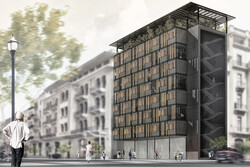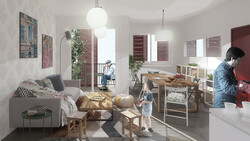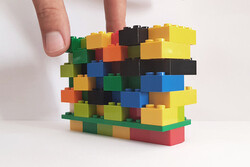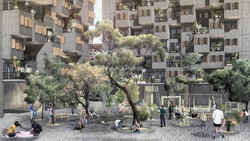
Doorway is a non-profit charity foundation that helps reintegrate homeless people back into society by providing them with jobs and shelter. The design prompt was to propose an architectural concept that was low-cost, scalable, and able to be applied on different sites while retaining its identity.

As a point of departure, by fiveten draws inspiration from the name Doorway, and reinterprets the abat-jour (Mediterranean shading device adopted in Lebanon) in a contemporary building. The sliding wooden shutters perform on functional, aesthetic, and iconic levels as well as on the individual and building scale. The building façade is in constant transformation as the residents adjust the shutters throughout the day according to their need of sun or shade. The pairing of these shutters and fair-faced concrete produce a recognizable identity for the foundation that merges both, the traditional and the contemporary.
In order to maintain low costs of construction, the housing units are designed in a modular system with three possible configurations depending on the number of inhabitants. The fair-faced concrete allows manufacture off-site and it, along with other materials for construction, can be found and/or produced locally.

On the ground level, the storefronts are where the building inhabitants engage with the community. The shops are rented out to cover the building’s maintenance costs, and are used by the residents where they can be employed and learn new skills and crafts.
The building also features a public backyard space, accessible by residents and the community as a communal public space.

Common spaces are provided on the ground floor (backyard facade) for the building inhabitants, such as classrooms where multiple daily classes will be held for anyone interested in enhancing their skills, and a communal kitchen that acts as a healing space for people to come together, learn about one another and from each other.
Lastly, the interiors are designed to be minimal open spaces separating the public and private spaces with living and dining on one end, and sleeping quarters on the other. The units also feature a balcony, a staple of traditional Lebanese culture as well as small kitchenettes in the units which encourage the residents to use the larger communal kitchen in order to encourage interaction between inhabitants.
- Location: Lebanon
- Program: Social Housing
- Year: 2018
- Category: Architecture
- Team: Dana Muhsen, Omar Bacho
© by fiveten 2023
